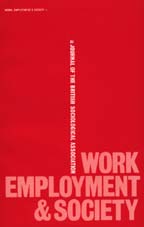No CrossRef data available.
Article contents
CLASS AND THE CHANGING NATURE OF WORK: TESTING HYPOTHESES OF DESKILLING AND CONVERGENCE AMONG SWEDISH EMPLOYEES
Published online by Cambridge University Press: 01 December 1998
Abstract
The changing nature of work is often supposed to be of consequence for interest formation and political alliances between social classes. Three hypotheses are tested: classes converge due to the deskilling of white-collar work or the upskilling of blue-collar work; lower white-collar workers essentially share the conditions of manual workers; the gender dimension cross-cuts the class dimension. Empirical analyses are carried out on the Swedish Level of Living Surveys in 1968, 1974, 1981 and 1991. The major trend is towards an upskilling, though jobs have not become less monotonous. There are signs of class convergence, e.g., in wages and authority, but sharp differences remain. While class divisions exist for both men and women, gender differences within classes are substantial for physical working conditions and market capacity. For several indicators, lower white-collar workers are exposed to similar conditions as manual workers while men in the highest stratum stand out as the consistently most privileged.
- Type
- Research Article
- Information
- Copyright
- © 1998 BSA Publications Ltd


